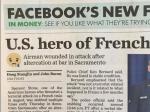Earlier this week, Facebook began testing out ‘emoji reactions’ in Ireland and Spain, but it looks like one of the largest US newspapers has already figured out how to misuse them.
On Friday, USA Today ran its front-page articles with cartoon Facebook emojis sitting next to each article, presumably to indicate how the editorial staff felt about each story. Or maybe how they thought their readers would feel. It’s honestly hard to tell.
Tweet Embed:
https://twitter.com/mims/statuses/652538611892666368
I don't know if you've picked up a newspaper lately, but...uh, how long has USA Today had emojis? pic.twitter.com/77nZIhV1eA
USA Today no doubt hoped to score points as a digitally-hip and forward-thinking newspaper by incorporating the Facebook emoji into its print newspaper. But the experiment appears to have quickly backfired.
The contrast of a sad-faced crying emoji, usually associated with frivolous teenager text message conversations, appearing next to an article titled, “U.S. hero of French train attack stabbed,” rubbed many people the wrong way.
Tweet Embed:
https://twitter.com/mims/statuses/652524147420082176
Wth @USATODAY? Emojis with horrifying news!? #inappropriate @HuffingtonPost @chicagotribune @CTAFails @funnyordie pic.twitter.com/0v8KWvRo2u
Tweet Embed:
https://twitter.com/mims/statuses/652533826506387456
Not awkward. Hideous and wrong. USA Today Used Facebook's New Emojis on Its Front-Page Stories, and It's Awkward http://t.co/hXIQbjnCjI
Tweet Embed:
https://twitter.com/mims/statuses/652467591097765888
I'm glad USA Today started using emojis. Otherwise I wouldn't have known how to feel about a hero getting stabbed. pic.twitter.com/TfAcKsSUtH
David Callaway, the editor-in-chief of USA Today, provided this comment to AdWeek about the paper: “Social media and its icons are becoming a dominant form of communication in our world. We wanted to show what they would be like if transferred to print.”
This statement is cryptic at best.
If this was some sort of meta-commentary about how online communication is cheapening the sanctity of print journalism, then perhaps it succeeds. But it’s hard to imagine Callaway would risk offending a potentially large swath of the population to make some obscure point about #journalism.
Business Insider has reached out to USA Today for comment.
NOW WATCH: Footage shows tourists captured by gunmen at a Philippine resort
See Also:
- There is a specific sociological reason why Facebook introduced its new emoji 'reactions'
- The Facebook 'dislike button' is here — and it’s actually emoji reactions
- The crucial 'Safe Harbor' agreement that Europe's top court just dramatically rejected, explained in emoji
SEE ALSO: The Facebook 'dislike button' is here — and it’s actually emoji reactions
